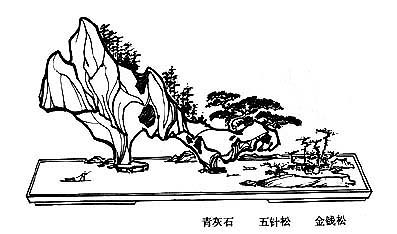Lun Yu 
 – Les Entretiens de Confucius
– Les Entretiens de Confucius
Le Maître échange propos, anecdotes, brèves paraboles et maximes avec ses disciples. Tr. Couvreur (fr), Legge (en) et Lau (en).
Lunyu X. 4. (244)
En entrant à la porte du palais, il se courbait comme si la porte avait été trop basse pour le laisser passer. Il ne se tenait pas au milieu de l'entrée ; en marchant, il évitait de mettre le pied sur le seuil. En passant auprès du siège du prince1, l'air de son visage paraissait changé et sa démarche accélérée ; les paroles semblaient lui manquer. Il montait à la salle d'audience, tenant sa tunique relevée, ayant le corps incliné, et retenant son haleine comme s'il ne pouvait plus respirer. En sortant, dès qu'il avait descendu le premier degré, son visage reprenait son air accoutumé ; Il paraissait apaisé et joyeux. Arrivé au bas des degrés, il hâtait le pas, comme un oiseau qui étend les ailes. En retournant à sa place, il paraissait éprouver une crainte respectueuse.
Couvreur X.4.
Demeanor of Confucius in the court at an audience.
1. When he entered the palace gate, he seemed to bend his body, as if it were not sufficient to admit him.
2. When he was standing, he did not occupy the middle of the gateway; when he passed in or out, he did not tread upon the threshold.
3. When he was passing the vacant place of the prince, his countenance appeared to change, and his legs to bend under him, and his words came as if he hardly had breath to utter them.
4. He ascended the reception hall, holding up his robe with both his hands, and his body bent; holding in his breath also, as if he dared not breathe.
5. When he came out from the audience, as soon as he had descended one step, he began to relax his countenance, and had a satisfied look. When he had got the bottom of the steps, he advanced rapidly to his place, with his arms like wings, and on occupying it, his manner still showed respectful uneasiness.
Legge X.4.
On going through the outer gates to his lord's court, he drew himself in, as though the entrance was too small to admit him. When he stood, he did not occupy the centre of the gateway;' when he walked, he did not step on the threshold. When he went past the station of his lord, his face took on a serious expression, his step became brisk, and his words seemed more laconic. When he lifted the hem of his robe to ascend the hall, he drew himself in, stopped inhaling as if he had no need to breathe. When he had come out and descended the first step, relaxing his expression, he seemed no longer to be tense. When he had reached the bottom of the steps he went forward with quickened steps as though he was gliding on wings. When he resumed his station, his bearing was respectful.
Lau [10:3]
b. Pada waktu berdiri tidak pernah ditengah pintu, dan pada waktu melaluinya tidak menginjak ambang pintu.
c. Pada waktu melewati tahta, wajahnya nampak berubah, kakinya agak ditekuk, dan kata-kataNya terdengar perlahan.
d. Pada waktu menaiki balairung, jubahNya diangkat dengan rapih, badanNya membongkok, napasNya ditahan seoralh-olah tidak bernapas.
e. Pada waktu turun kembali, begitu turun di tingkat pertama, wajahNya nampak gembira dan sikapNya lebih leluasa. Setelah sampai di bawah, cepat-cepat berjalan dengan tangan seperti burung membentangkan sayap menuju tempatNya, dan sikapNya tetap hormat serta sedap dipandang.

Les Entretiens de Confucius – Lun Yu X. 4. (244) – Chinois off/on – Français/English
Alias the Lunyu, the Lun Yü, the Analects, les Entretiens du maître avec ses disciples.
Le Canon des Poèmes, Les Entretiens, La Grande Étude, Le Juste Milieu, Les Trois Caractères, Le Livre des Mutations, De la Voie et la Vertu, 300 poèmes Tang, L'Art de la guerre, Trente-six stratagèmes
Bienvenue, aide, notes, introduction, table.
Index – Contact – Haut de page























